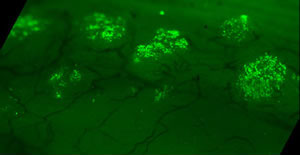Dr. Thomas Phillips
Dr. Thomas Phillips

PhD, 1982 Northwestern University
Morphology and immunocytochemistry of mucosal epithelial cells
Fluorescent stereoscopic view of lymphoid nodules in the Guinea pig conjunctiva. The sialyl-lactose binding lectin MAL-I selectively labels the antigen sampling M cells in the follicle associated epithelium.
My laboratory studies the epithelium of mucosal surfaces. The term “epithelium” refers to the type of cells that line the surfaces of internal organs that face a lumen or cavity as well as those that cover the external surfaces of the body. Mucosal epithelia are a subtype in which one of the cell types in the epithelium secretes high molecular weight mucin glycoproteins (“mucus”). My research group uses bright field microscopy, wide-field and confocal immunocytochemistry and electron microscopy, in combination with biochemical and molecular genetic techniques, to study mucosal cell biology in the conjunctiva (the inner surface of the eyelid) and intestinal tract.
Organized mucosa associated lymphoid tissue (o-MALT) consists of lymphoid follicles which are covered by a layer of specialized epithelium. The importance and function of o-MALT in the gastrointestinal tract is well established but our laboratory has been focused on establishing its importance in the conjunctiva. O-MALT contains a morphologically and functionally unique epithelial cell type, known as an M cell, which transports environmental antigens into the follicle to induce a host immunologic response. M cells also serve as portals of entry for viral and bacterial pathogens. We have succeeded in demonstrating that M cells in the Guinea pig and rabbit conjunctiva selectively bind and translocate lectins, fluorescent latex beads and bacteria such as Haemophilus influenzae. We are now investigating the efficacy of ocular immunization via M cell delivered immunogens. In addition to our studies using animal models, we are working on developing an in vitro models of conjunctival goblet cells and M cells using an immortalized human conjunctival cell line.
The morphological and immunocytochemical approaches the laboratory uses are well suited for many studies outside of mucosal cell biology. Recent collaborative projects include characterization of proteins expressed by Haemophilus influenzae, intracellular trafficking of human immunoglobulins in transgenic seed tissues, biogenesis of plant storage vacuoles, compartmentalization in pollen tubes, apolipoprotein B100 trafficking in liver cells, and the role of bacterial biofilms in recalcitrant otorrhea.
Dr. Abraham Eisenstark Faculty Fellowship Award in Biological Sciences 2018
Curators’ Distinguished Teaching Professor 2016
Maxine Christopher Shutz Award for Distinguished Teaching 2014
Arts & Science Student Council’s “Favorite MU Faculty Mentor” 2007
Kemper Teaching Fellow for Excellence in Teaching 2006
Mortar Board Inductee 2002
Blue Chalk Award for Undergraduate Advising 2002
Excellence in Education Award 1999
Purple Chalk Award for Teaching Excellence 1998
Outstanding Greek Faculty Award 1997
Blue Chalk Award for Undergraduate Advising 1997
